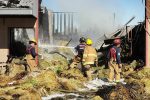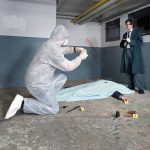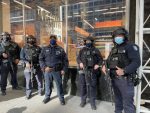Criminal Justice
This section includes information about salaries, education requirements, career paths, and job prospects for some of the most in-demand criminal justice occupations.
If you want to become a police officer, fire investigator, coroner, fingerprint technician, or security officer and you want to find out more about what to expect, this page is for you.

How to Become an Arson Investigator
An arson investigator determines the cause of a fire by examining the scene of the blaze, interviewing witnesses, and communicating…

How to Become a Blood Spatter Analyst
Blood Spatter Analysts are specialized individuals who work with other professionals such as law enforcement and forensic scientists to solve…

How to Become a Body Guard
A body guard’s main responsibility is to avoid and prevent conflict that is capable of endangering or harming their client….

How to Become a Cop
When you become a cop you can look forward to a job that will offer you a lot of variety,…

How to Become a Coroner
If you have an interest in medicine, criminal justice, and law enforcement, then you might like to become a coroner….

How to Become a Corrections Officer
When you become a corrections officer, you are responsible for the safety and well-being of prisoners within secure custody. Other…

How to Become a Crime Scene Investigator
If you are intrigued by law enforcement, have an investigator’s eye, and want a job that allows you to give…

How to Become a Criminal Psychologist
Criminal Psychologists are professionals who are specialized in the psychology of criminals. These professionals are highly skilled in studying and…

How to Become an FBI Agent
An FBI Agent is responsible for investigating crimes within the US such as murder, fraud, kidnapping, or armed robbery. They…

How to Become a Fingerprint Technician
If you’re interested in law enforcement and looking for a career that will allow you to make a difference, then…

How to Become a Fire Inspector
A fire inspector works to make sure that homes and businesses are safe and secure for those people that live…

How to Become a Firefighter
Firefighters work to protect people and property from the hazards of fire, as well as other disasters. Firefighters will respond…

How to Become a Forensic Scientist
Working as a forensic scientist is a challenging role suited to those with analytical and enquiring minds. If all things…

How to Become a Jail Warden
Jail Wardens are responsible for overseeing and managing a variety of aspects in a state run correctional facility. Jail Wardens…

How to Become a Parole Officer
Parole Officers are experienced professionals who supervise individuals who have recently been released from prison after serving a portion of…

How to Become a Police Detective
If you are looking for a role in law enforcement where no two days will ever be the same, then…

How to Become a Police Officer
If you are looking for a career that is fast-paced and has a lot of variety, you might like to…

How to Become a Private Investigator
If you are an observational person with an eye for detail and a knack for research you might like to…

How to Become a Probation Officer
Want to make a difference to the lives of those people who want a second chance? If so, then you…

How to Become a Security Officer
A security officer works to protect a property, guard a person or asset, or keep order at an event. If…

How to Become a SWAT Team Member
When you become a SWAT team member, you will work to provide a timely and effective response to emergency situations….

How to Become an Undercover Agent
Undercover Agents are professionals who use an alternate identity in order to provide detective work for a special assignment. Undercover…

How to Become a US Marshal
US Marshal Service is a branch of law enforcement that forms a part of the Department of Justice. When you…
Work Environment
According to a report published by the Bureau of Labor Statistics, police officers and detectives held approximately 795,000 jobs in 2020, most of them (about 671,200) being police and sheriff patrol officers.
Detectives and criminal investigators held 112,500 jobs, while 7,500 jobs were held by fish and game wardens.
Transit and railroad police held 3,800 jobs in the United States.
Most police and detectives worked for local governments but they also hold jobs at the state government and the federal government level.
Job descriptions for criminal justice workers vary widely depending on the employer and their occupation.
For example, FBI special agents must work at least 50 hours a week and are on call 24 hours per day, 7 hours per week.
Most fire inspectors and investigators work for local governments, but some are employed by state governments, colleges, or even the manufacturing sector.
Many criminal justice occupations, such as police officers, detectives, and fire investigators, work mostly in the private sector.
For example, 61 percent of the 1.1 million security guards in the United States worked for companies that provide investigation, guard, and armored car services.
Some criminal justice workers, such as court reporters and bodyguards work as freelancers who charge an hourly rate.
Injuries and illnesses are associated with some of the criminal justice occupations.
For example, forest fire inspectors and prevention specialists have one of the highest rates of injuries and illnesses.
Fire inspectors and investigators are sometimes exposed to toxic fumes and other hazardous agents.
Police, sheriff’s patrol officers, and transit and railroad police also have a high rate of injuries and illnesses and may be exposed to high-risk situations when they have to make good decisions on the spot and act quickly.
Education Requirements
Education requirements for police and detectives range from a high school diploma to a college degree.
Most police and detectives complete a period of on-the-job training after graduating from their agency’s training academy.
During police academy, students attend classroom instruction that covers state and local laws as well as constitutional law, civil rights, and ethics.
Recruits also receive supervised experience on patrol, traffic control, firearm use, first aid, self-defense, and emergency response.
Education and training requirements also vary depending on the sector of employment.
For example, for employment in federal prisons, correctional officers and bailiffs need to have at least a bachelor’s degree or 1 to 3 years of experience.
Degree fields for criminal justice workers vary between social science, law enforcement, security and protective service, and more.
Federal law enforcement agents undergo special extensive training, usually at the U.S. Marine Corps base in Quantico or a Federal Law Enforcement Training Center.
Most occupations in the criminal justice field become eligible for promotion after earning a few years of experience.
For police officers, promotions to corporal, sergeant, lieutenant, and captain and usually made according to scores obtained on a written examination while also taking into account the officer’s performance on the job.
Paralegals need an associate’s or bachelor’s degree in legal studies or law.
There are also certificate programs for those who have already graduated from college and need intensive training in paralegal studies.
Besides the formal training, criminal justice workers also need special skills, such as:
Communication skills- it is important for most criminal justice workers to communicate well with the public or with other workers.
Empathy is very important, especially for those who work directly with people, such as police officers.
Physical stamina- many criminal justice workers need to be in good physical shape, and they are required to pass tests before entering the field.
Physical strength is an important skill, especially for police offers, bodyguards, and other professions who may have to confront suspects or dangerous people.
Research skills are required for paralegals, investigators, and other criminal justice workers who have to research laws, regulations, and evidence.
Salary
According to the Bureau of Labor Statistics, the median annual wage reported by police and detectives was $67,290, which means that half of all workers in these professions earned less than this amount while half earned more.
Salaries in this field vary between less than $40,000 and more than $110,000, depending on experience, education, employer, and other factors.
Detectives and criminal investigators earned $86,940 per year, on average, while transit and railroad police made $72,580.
The median annual wage was $65,540 for police and sheriff patrol officers and $58,040 for fish and game wardens.
The top-paying employer for police and detectives in the United States was the federal government which offered a median annual salary of $92,080.
Officers who worked for state governments earned $70,280 per year, as of May 2020, on average, while those who worked for local governments made $65,850.
Paid overtime is very common for careers in criminal justice.
Many law enforcement agencies provide officers with allowances for uniforms and extensive benefits.
Workers in this profession have the option to retire at an age younger than the typical retirement age.
Having a college degree and being bilingual can help you earn more as a police officer.
Salaries for criminal justice workers vary widely depending on the occupation, the region, the industry of employment, the level of government funding, and other factors.
Security guards made $31,050 per year as of May 2020, with salaries fluctuating between less than $25,000 and more than $50,000, depending on factors such as experience level, education, and skills.
Court reporters earned $61,660 per year, on average, as of May 2020 but salaries varied between less than $35,000 and more than $100,000.
Regardless of the profession, workers can advance in their careers and improve their earning prospects by getting additional certificates or by earning a degree in a relevant field.
Some professions, such as police officers, advance in their careers after passing some tests, while also taking into account their performance on the job.
Employment Prospects
Most criminal justice professions will grow in the future, but the growth rate varies widely depending on the type of occupation and the level of government funding.
Employment prospects also vary depending on the region and the level of government spending.
According to the Bureau of Labor Statistics, employment for police and detectives is projected to grow 7 percent from 2020 to 2030, with many job openings resulting from the need to replace workers who leave the occupation or retire.
A higher growth rate is projected for paralegals and legal secretaries, a profession that will grow 12 percent by 2030.
This growth is explained, in fact, by the fact that more tasks in a law firm will be performed by entry-level paralegals to reduce legal costs for clients.
Moreover, as outside counsel becomes more expensive, many companies prefer to have their in-house legal departments.
Forensic science technicians will see job growth of approximately 16 percent from 2020 to 2030, but because this is a small occupation, it will result in only 2,700 new jobs.
Additional forensic science technicians will be hired by state and local governments to process their many caseloads.
Forensic technicians will also be needed to process objective forensic information that is used as evidence in trials.
There are also criminal justice professions for which the growth will be tempered by the implementation of new technologies, federal regulations, and budget cuts.
One such example is the profession of court reporter which will see an employment growth of approximately 3 percent from 2020 to 2030, slower than the average for all occupations.
The growth will be limited by budgetary constraints and the increased use of digital audio recordings in court.
Employment for probation officers and correctional treatment specialists is expected to grow 4 percent from 2020 to 2030.
The growth is explained, in part, by the fact that community corrections are viewed as a more economically viable alternative to incarceration in some cases.
Parole officers will continue to be needed to supervise individuals who are released from prison.
Employment for probation officers will vary depending on the government funding and how much money is allocated to probation and parole systems.
Frequently Asked Questions
What are the employment prospects of criminal justice occupations?
Most criminal justice professions are expected to grow in the future, with rates that vary between 3 percent and more than 15 percent.
Employment prospects will see an important growth for paralegals and forensic science technicians, while for some professions, such as court reporters, this growth will be limited due to technological advancements and government cuts.
How much does a criminal justice worker make?
Salaries in the criminal justice field vary widely depending on experience level and the employer.
Some professions, such as security officers earned approximately $31,000 per year on average, while others can make more than $80,000.
In most cases, the wage increases as the workers become more experienced.
Do I need a college degree if I want to find a job in the criminal justice system?
The answer to this question depends on the occupation that you are targeting.
For some professions, such as security guard, a high school diploma is enough.
Other professions, such as paralegals or forensic science technicians, require a degree.
Many workers also need specialized on-the-job training or to complete a training academy.
What is the biggest employer for criminal justice workers?
Many criminal justice workers, such as police officers or fire investigators are hired by local, state, or federal governments.
However, there are also professions, such as security guards, who work mostly in the private sector or as freelancers.









